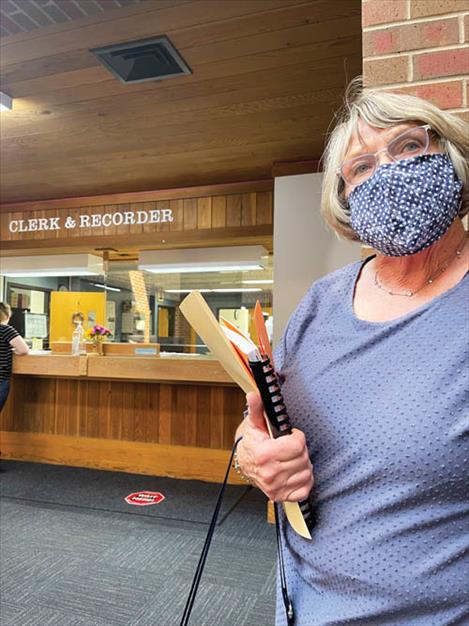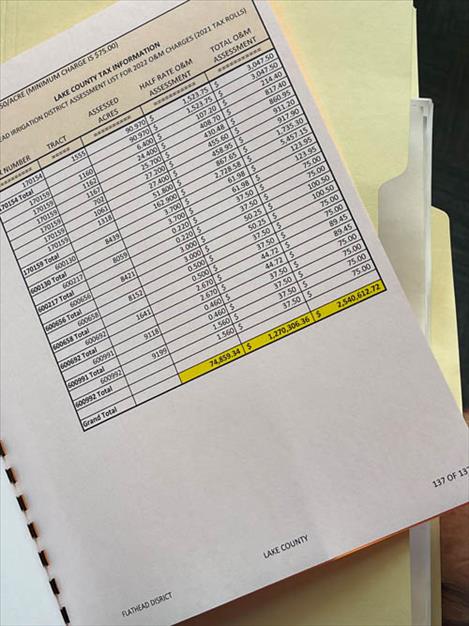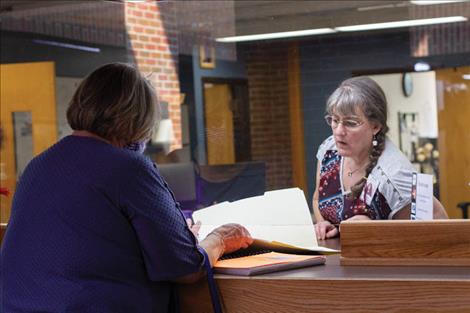Irrigation commissioner: resolution not in best interest of communities
Hey savvy news reader! Thanks for choosing local.
You are now reading
1 of 3 free articles.
LAKE COUNTY – As Flathead Irrigation District Commissioner Janette Rosman read about the Lake County commissioners’ decision to halt irrigation repairs, she was a bit perplexed.
She first discovered the changes that impact irrigation water through Facebook. She continued to find more information as she read the July 28th issue of Valley Journal and learned that Lake County Commissioners had decided to halt repairs on bridges crossing over canals and culverts that they deemed to be the responsibility of the Flathead Indian Irrigation Project.
The Valley Journal article said: “Basically, the commissioners believe the Montana Water Rights Protection Act, signed into law last year, raises jurisdictional issues that have yet to be clarified. Among these is the question of who takes care of project infrastructure that county roads traverse.” It continued: “The commissioners are also writing a Resolution of Intent that would end the county’s collection of irrigation fees, which are dispersed to the three irrigation districts that operate in Lake County.”
Commissioner Gale Decker wrote in an email reported in the article: “The county is reluctant to replace infrastructure that we don’t own and that CSKT has been awarded $1.9 billion for replacement, repair and rehabilitation.”
Rosman wanted to know why the Lake County commissioners had not contacted the irrigation districts concerning these changes. “I was made aware of Lake County commissioners’ resolution while looking at a Facebook post Wednesday night following our Flathead Irrigation District meeting,” she said. “I zoomed in on it and read the Lake County agenda resolution regarding irrigation. I was a bit perplexed and concerned about the agenda item.”
On Thursday, at 2:11 p.m., she called the Lake County commissioners and requested a copy of the resolution. It was emailed to her at 2:25 p.m. She was busy looking into the agenda item when the phone started to ring. “I received a couple of calls and emails from the public asking me what I knew about the article in Valley Journal and the resolution,” she said. “Lake County commissioners and the assistant Lake County Attorney made no effort to call the Flathead Irrigation commissioners and request a meeting regarding the irrigation issues they addressed in the resolution.”
The Flathead Irrigation District commissioners knew so little about the change on Wednesday, July 28, that they were in the process of signing their resolution for operations and maintenance irrigation assessments as the county commissioners were signing a resolution of intent to end the collection of irrigation fees for the annual operations and maintenance irrigation charges.
“I have prepared all the assessment documents every year since Flathead Joint Board of Control was disbanded,” she said. “The county has never reminded me that documents for assessing the irrigators, via their tax statements, had to be in the first week in August. I learned the process through the clerk and recorder at that time and have diligently had the operation and maintenance and administration fee resolution documents signed and notarized and filed with Sanders and Lake County. I did so today, one day after reading the Valley Journal and Lake County Resolution.”
Rosman shared the information in the documents she filed. In Sanders County, there are 11,925.77 irrigated acres. The total 2022 operation and maintenance water assessment bill is $400,005.48. In Lake County, there are 74,859.34 acres. The total 2022 operations and maintenance water assessment bill is $2,540,612.72. “Think of the impact these irrigators will have if Lake County no longer collects assessment fees in 2022,” she said. “Think of how much tax money the irrigators in Lake County generate for the entire Mission and Hot Springs Valley.”
“It concerns me there was no effort made to contact Flathead District commissioners, and knowing that, have Lake County commissioners made any effort to sit down with CSKT – who have the option of managing the project along with one or more irrigation districts?”
The Confederated Salish and Kootenai Tribes secured $1.9 billion in a water rights compact settlement in 2020. Rosman said the funds will be coming in soon for the Flathead Indian Irrigation Project. Rosman wonders if the tribe and the county could sit down and create an agreement on county road concerns related to the project. She said two Flathead Irrigation District commissioners have been sitting down with CSKT officials and are at the beginning stages of negotiating a cooperative management entity. She said negotiating is “the only means that the irrigators will ever have any participation in managing their irrigation water.” She continued to say: “It doesn’t help Flathead Irrigation District when our county commissioners send out a resolution that is not in the best interest of the two communities in Lake County (tribal and non-tribal). It doesn’t help the irrigators who are desperately attempting to keep their irrigation ditches full of water this summer that are impacted by drought conditions.”



















